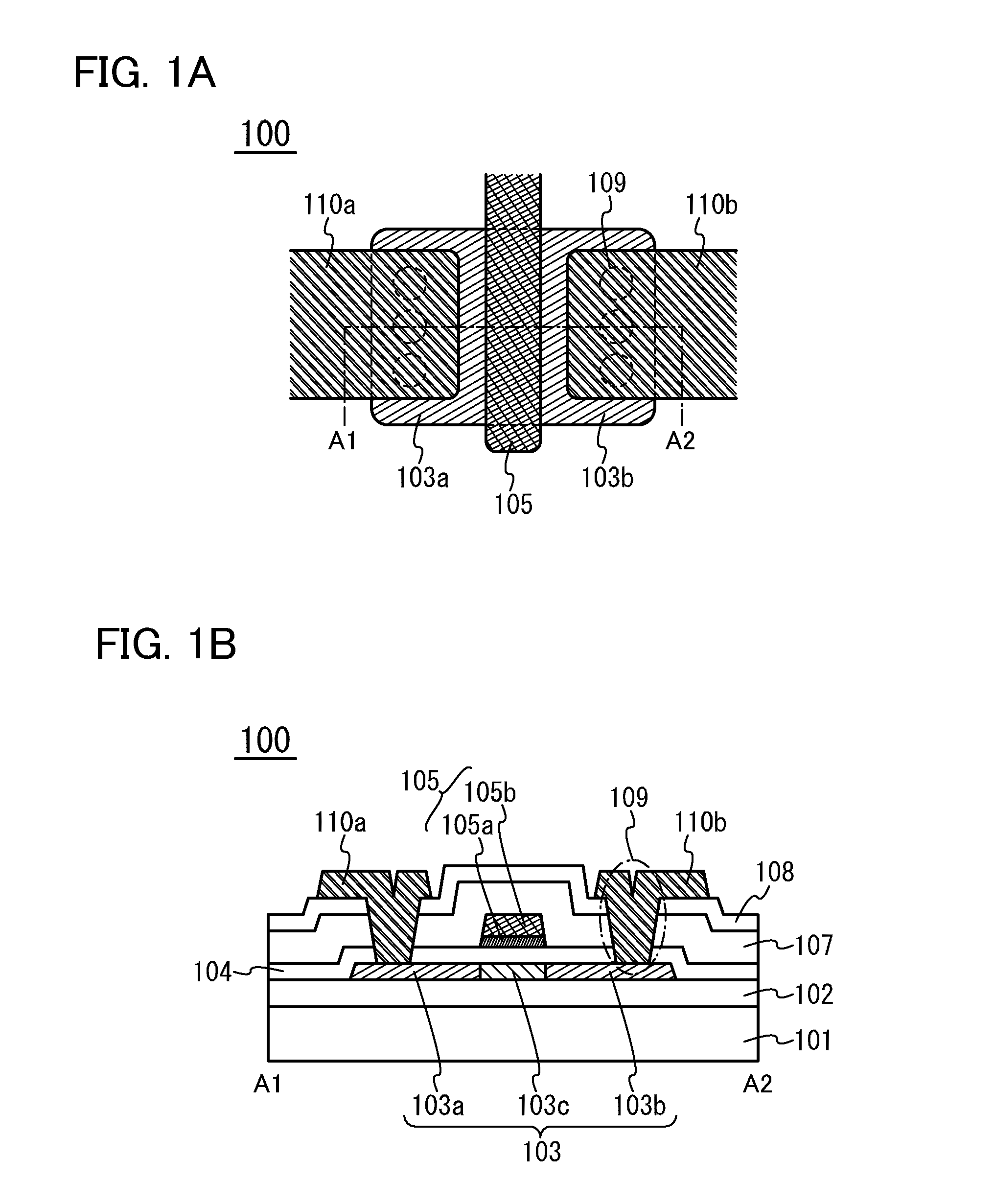Semiconductor device and manufacturing method thereof
- Summary
- Abstract
- Description
- Claims
- Application Information
AI Technical Summary
Benefits of technology
Problems solved by technology
Method used
Image
Examples
embodiment 1
[0063]In this embodiment, a transistor in which an oxide semiconductor is used for a channel and a manufacturing method thereof will be described with reference to FIGS. 1A and 1B, FIGS. 2A and 2B, FIGS. 3A to 3D, and FIGS. 4A and 4B.
[0064]FIG. 1A is a top view illustrating a structure of a transistor 100 which is one mode of a structure of a semiconductor device, and FIG. 1B is a cross-sectional view illustrating a cross-sectional structure of a portion indicated by a chain line A1-A2 in FIG. 1A. In FIG. 1A, a substrate and an insulating layer are omitted.
[0065]In the transistor 100 illustrated in FIGS. 1A and 1B, a base layer 102 is formed over a substrate 101, and an oxide semiconductor layer 103 is formed over the base layer 102. A gate insulating layer 104 is formed over the oxide semiconductor layer 103, and a gate electrode 105 is formed over the gate insulating layer 104. An insulating layer 107 and an insulating layer 108 are formed over the gate electrode 105, and a source...
embodiment 2
[0209]In this embodiment, examples of transistors having structures different from those of the transistors disclosed in Embodiment 1 will be described.
[0210]FIG. 5A is a top view illustrating a structure of a transistor 150 and FIG. 5B is a cross-sectional view illustrating a stacked structure of a portion indicated by a chain line C1-C2 in FIG. 5A. In FIG. 5A, a substrate and an insulating layer are omitted.
[0211]In the transistor 150 illustrated in FIG. 5B, the source electrode 110a and the drain electrode 110b are stacked in a different manner from the stacking manner of the transistor 100 disclosed in Embodiment 1. In the transistor 150, the source electrode 110a and the drain electrode 110b are formed over the base layer 102, and the oxide semiconductor layer 103 is formed over the base layer 102, the source electrode 110a, and the drain electrode 110b.
[0212]In the transistor 150, the source electrode 110a and the drain electrode 110b are connected to the source region 103a a...
embodiment 3
[0230]In this embodiment, a method for forming an oxide semiconductor film including CAAC-OS, which is different from the method disclosed in Embodiment 1, will be described.
[0231]First, an oxide semiconductor film having a thickness of greater than or equal to 1 nm and less than or equal to 50 nm is formed over the base layer 102.
[0232]The substrate temperature in deposition is set to higher than or equal to 150° C. and lower than or equal to 450° C., preferably higher than or equal to 200° C. and lower than or equal to 350° C. The deposition is performed while the substrate is heated to higher than or equal to 150° C. and lower than or equal to 450° C., preferably higher than or equal to 200° C. and lower than or equal to 350° C., whereby moisture (including hydrogen) or the like is prevented from entering a film. Further, CAAC-OS which is an oxide semiconductor layer having crystallinity can be formed.
[0233]Further, it is preferable that hydrogen be further released from the oxid...
PUM
 Login to View More
Login to View More Abstract
Description
Claims
Application Information
 Login to View More
Login to View More - R&D
- Intellectual Property
- Life Sciences
- Materials
- Tech Scout
- Unparalleled Data Quality
- Higher Quality Content
- 60% Fewer Hallucinations
Browse by: Latest US Patents, China's latest patents, Technical Efficacy Thesaurus, Application Domain, Technology Topic, Popular Technical Reports.
© 2025 PatSnap. All rights reserved.Legal|Privacy policy|Modern Slavery Act Transparency Statement|Sitemap|About US| Contact US: help@patsnap.com



